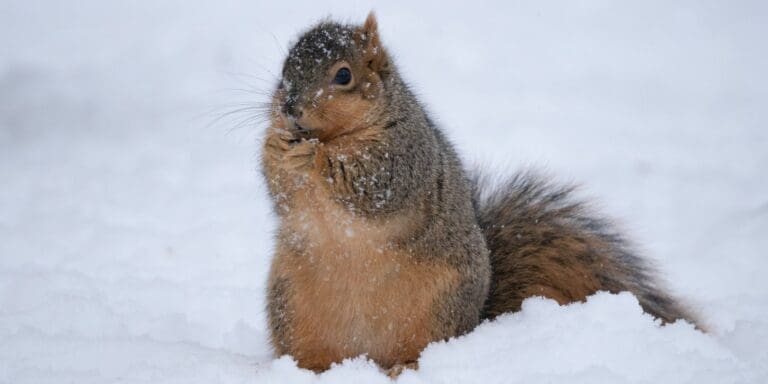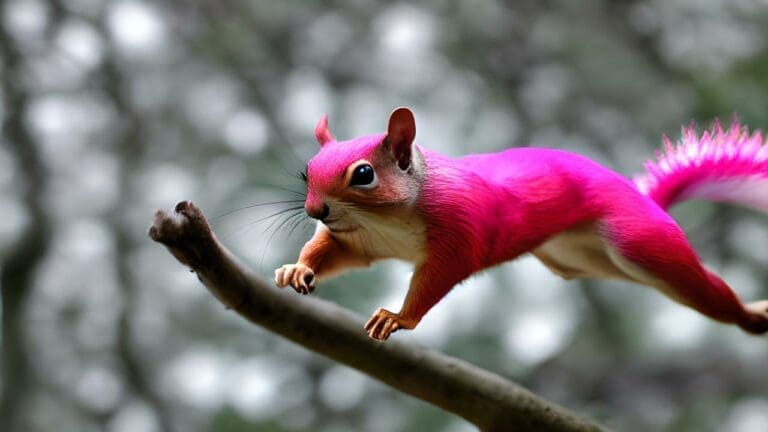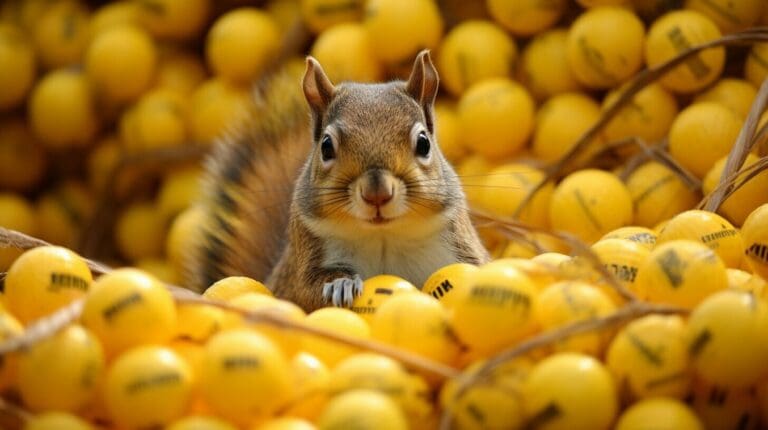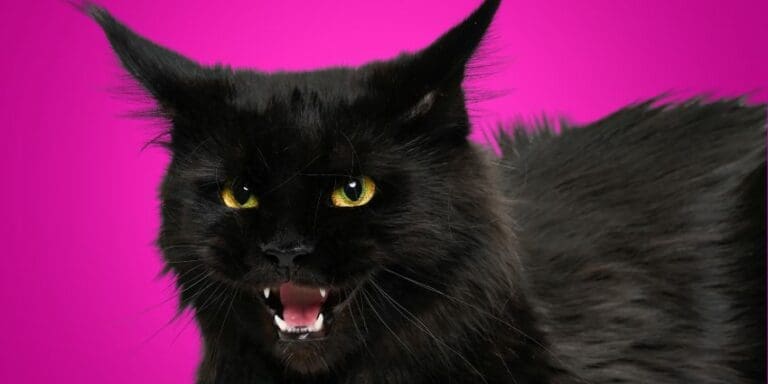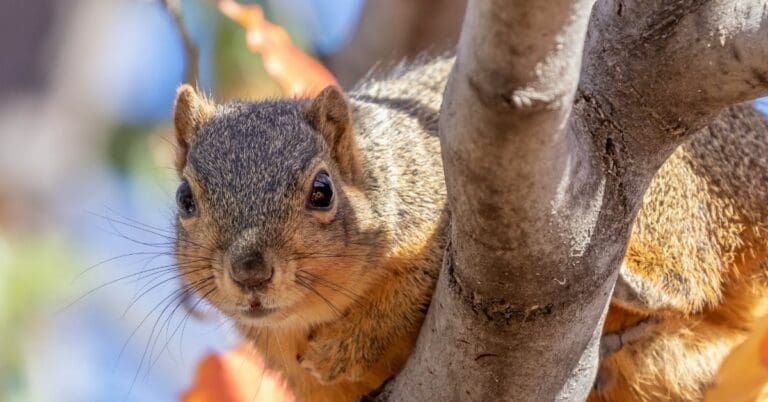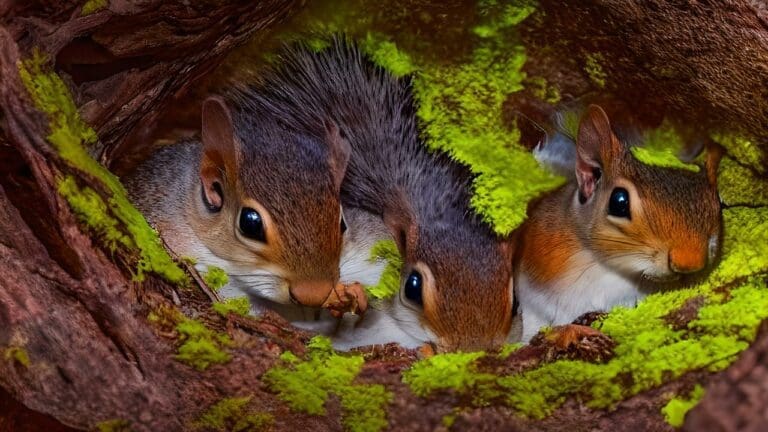Do Squirrels Eat Berries? The Fruity Facts
Did you know our backyards are like bustling cities for squirrels, complete with high-speed chases and all-you-can-eat buffets? Yeah, you heard that right! And at the top of the menu? Berries! Our data shows that squirrels aren’t just nut fanatics; they’re actually undercover berry connoisseurs! Let’s find out just how much they adore these sweet, juicy treats!
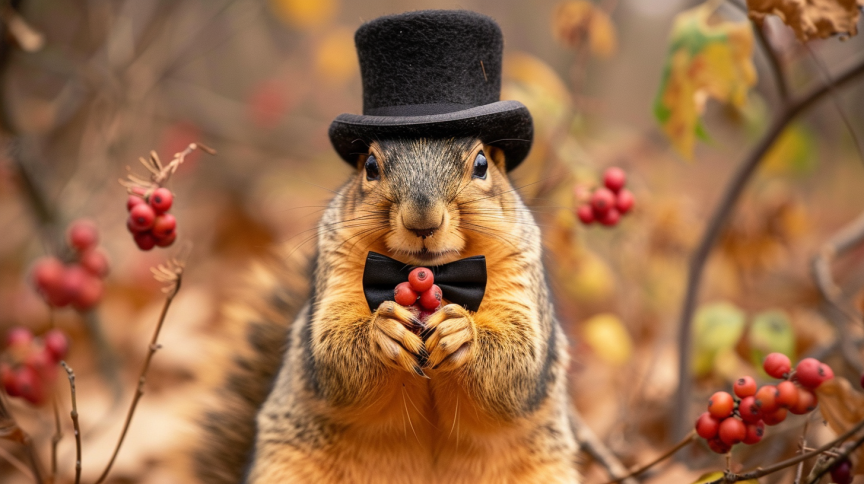
Do Squirrels Eat Berries?
Yes, squirrels do eat berries. They’re not picky eaters and will happily raid your berry bush for a juicy snack. Think of them as nature’s little berry connoisseurs!

Berries: A Squirrel’s Delight
The Berry Buffet: What’s on the Menu?
Squirrels are not finicky eaters when it comes to their berry choices. They feast on a variety, from the sweetness of strawberries and blueberries to the tartness of raspberries and blackberries, even enjoying the occasional cranberry. These berries are not just treats; they’re packed with vitamins and hydration, acting as nature’s multivitamin for these energetic creatures.
The Importance of Berries in a Squirrel’s Diet
Berries play a pivotal role in the health and hydration of squirrels. They offer essential nutrients and water, vital for squirrels to maintain their health and vitality, especially during the warmer months.
Squirrel Foraging Behavior: The Berry Hunters
Squirrels have an impressive ability to locate and select the juiciest berries. Utilizing their keen sense of smell and remarkable memory, they revisit known berry patches, showcasing their adeptness at berry picking. This foraging behavior not only feeds them but also entertains onlookers with their berry-picking antics.
The Wisdom of Squirrels: Selecting the Right Berries
Not all berries are beneficial, and squirrels instinctively know what to enjoy and avoid. This wisdom is a mix of inherited instincts and learned behavior, allowing them to navigate their diet safely, using their taste and smell to distinguish between safe and potentially harmful berries.
Seasonal Variations of Berries
What do squirrels eat when the pickings are slim? Let’s cast a glance at the common berries eaten by squirrels to understand their favorites:
Summer
- Strawberries – The red-ripe darlings of summer patches.
- Blueberries – Tiny globes of antioxidant-rich indulgence.
Late Summer to Early Fall
- Raspberries – Delicate yet brimming with sweet tartness.
- Blackberries – The thorny shrub’s generous gift.
Winter
- Cranberries – Pucker up for these winter-hardy bites.
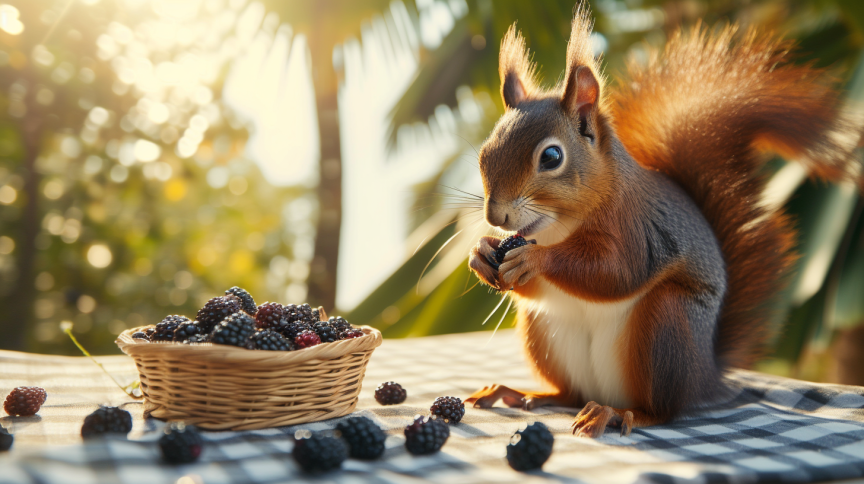
Squirrels’ Dietary Preferences and Adaptability
Squirrels know they must eat different foods to stay healthy. Depending on where they live and what type of squirrel they are, they might munch on different things. But some of their favorite snacks include:
- Nuts, such as acorns, hazelnuts, and walnuts
- Seeds, including sunflower seeds and pine cones
- Fruits, like berries, apples, and pears
- Vegetation, including leaves, flowers, and buds
- Insects, such as beetles, caterpillars, larvae, and sometimes lizards
- Occasionally, small vertebrates like birds’ eggs or nestlings
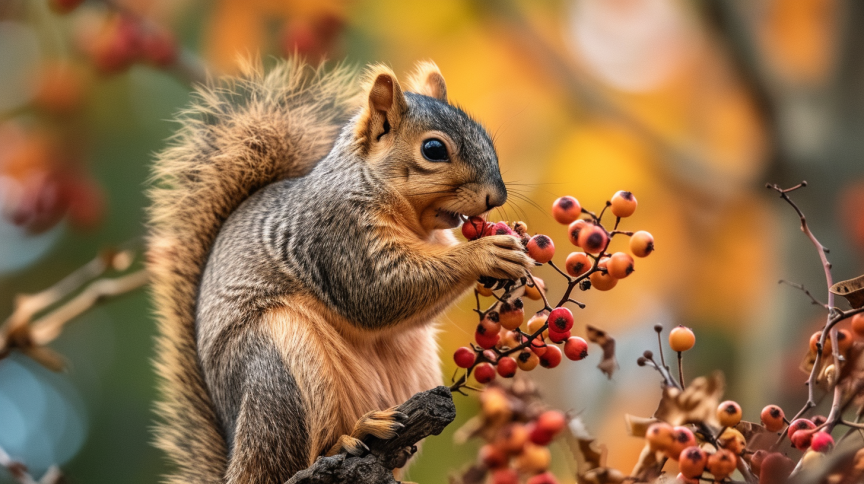
The Role of Squirrels in Seed Dispersal
Squirrels are like nature’s gardeners, especially when it comes to berries. Here’s how it works: as squirrels snack on berries, they end up spreading the seeds through their poop. This cool, if a bit yucky, method helps plant new berry bushes far and wide. So, we get more berries growing in the wild thanks to squirrels, making the world a bit more berry-licious!
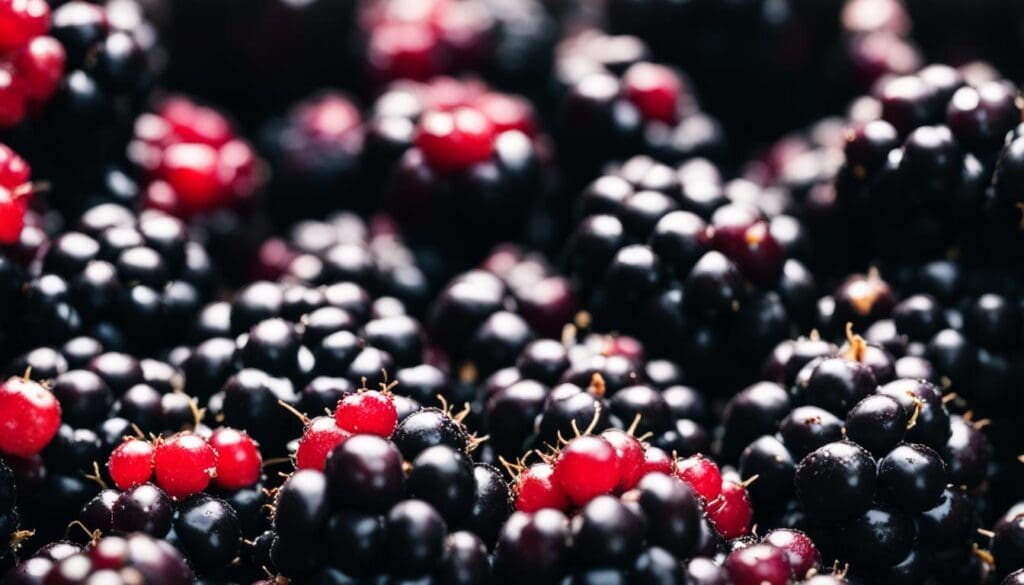
| Berry Type | Preferred by | Seed Dispersal Method |
|---|---|---|
| Blackberries | Eastern Gray Squirrels | Scat Transport |
| Blueberries | Red Squirrels | Hoarding and Dropping |
| Raspberries | Fox Squirrels | Discarding Partial Berries |
| Mulberries | Eastern Gray Squirrels | Scat Transport |
| Strawberries | Red Squirrels | Foraging Leftovers |
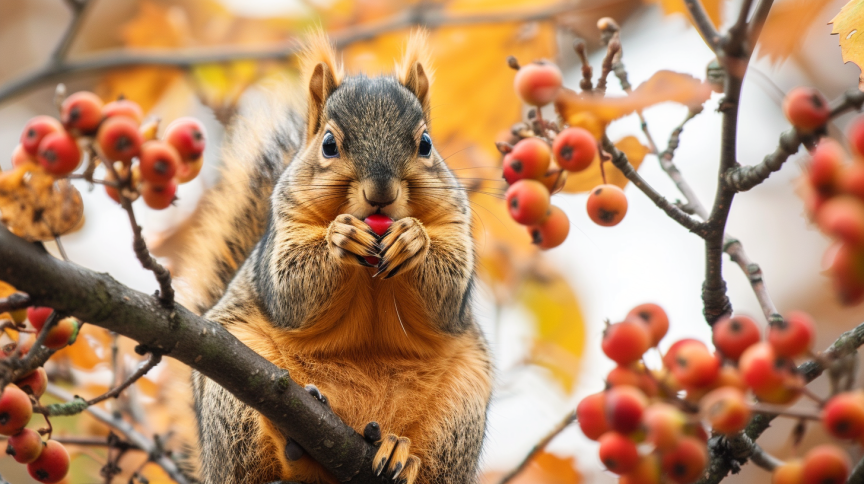
Protecting Your Berry Plants from Squirrels
By following these steps—starting with protective measures, maintaining a clean and less inviting environment for squirrels, using gentle deterrents, and offering alternative food sources—you can cultivate a peaceful coexistence with squirrels while protecting your precious berry harvest.
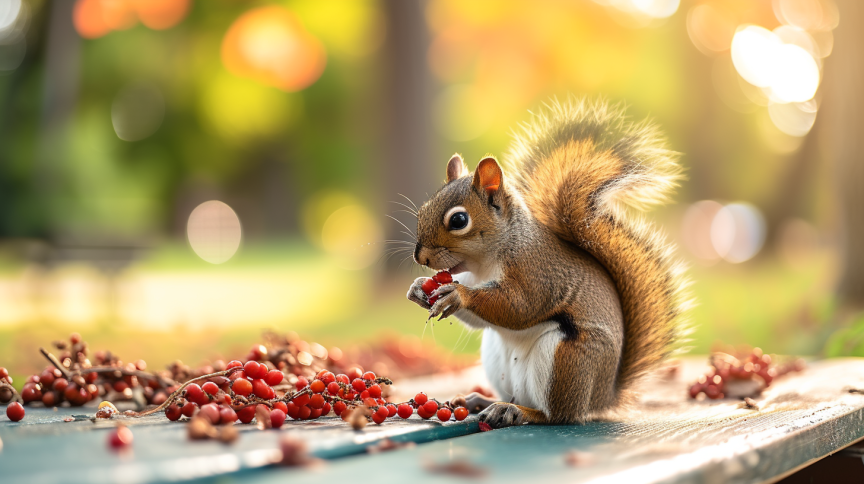
1. Begin with Barriers: Use Netting or Mesh
- Why It Works: Physical barriers are your first line of defense. Covering your berry bushes with netting or mesh shields them from squirrel invasions, effectively blocking access without harming the critters.
- How to Do It: Secure the netting or mesh tightly around your plants, ensuring no gaps. This prevents squirrels from reaching the fruits while allowing your plants to grow unhindered.
2. Maintain Your Garden: Regular Pruning and Cleanup
- Why It Works: A tidy garden reduces squirrel attraction. By keeping berry bushes well-trimmed and clearing away excess foliage, you make it harder for squirrels to reach the berries and less likely they’ll linger.
- How to Do It: Regularly trim your berry bushes and clean the garden area. Removing potential squirrel hiding spots and food sources discourages them from setting up camp.
3. Implement Humane Deterrents: Scare Tactics
- Why It Works: Non-harmful deterrents can keep squirrels at bay without causing distress. Motion-activated sprinklers or noisemakers startle squirrels away, while scarecrows are a visual deterrent.
- How to Do It: Place motion-activated devices or scarecrows near your berry plants. Ensure they are visible and active to effectively discourage squirrel visits.
4. Offer Alternative Food Sources: Divert Their Attention
- Why It Works: Providing squirrels with an easier food option can lure them away from your berries. By satisfying their hunger with less effort, squirrels are less likely to raid your berry bushes.
- How to Do It: Set up squirrel feeders filled with nuts and seeds away from your berry plants. This creates a win-win situation, keeping your berries and the squirrels happy.
Subscribe to the Free VIP Squirrel Scoop Insider Magazine
Written by none other than Bart the Balcony Squirrel, this lighthearted take on life and current squirrel-related world events is sure to bring a smile to your face. From his perch on the Kitty City Squirrels balcony, Bart brings a unique and entertaining perspective to every issue. Why wait, Subscribe now!
Conclusion
Exploring our natural world, it’s really important to know about the creatures that live in it and how they behave. Our deep dive into what squirrels like to eat gives us a clear answer: yes, squirrels definitely eat berries. This part of their diet is not just good for their health; it also helps keep our ecosystems rich and varied.
By understanding how squirrels live and eat, we can better appreciate the fine balance of nature and how it connects with the way we grow our food. It shows us just how important these little berry-loving critters are to keeping everything in harmony.
FAQ
Do squirrels eat berries?
Yes, squirrels do eat berries, including blackberries. While their primary diet consists of nuts, seeds, and fruits, squirrels have been known to incorporate berries into their diet as well.
What do squirrels eat?
Squirrels have versatile dietary preferences and consume a variety of foods, including nuts, seeds, fruits, insects, and even small vertebrates. Their diet varies based on the season and availability of food sources.
Are berries a common part of a squirrel’s diet?
While squirrels do eat berries, they are not a primary or exclusive part of their diet. Squirrels maintain a balanced diet that includes nuts, seeds, and vegetation along with berries.
What role do squirrels play in the dispersion of blackberry seeds?
Squirrels play a crucial role in the dispersion of blackberry seeds. Their consumption of blackberries aids in the propagation of blackberry plants in the wild, contributing to the overall diversity of flora in their habitats.
Can squirrels damage blackberry plants?
Yes, squirrels can potentially damage blackberry plants, especially in agricultural or home garden settings. While their foraging activities aid in seed dispersal, it can also lead to reduced fruit yield and potential damage to the plants.
How can I protect my blackberry plants from squirrels?
To coexist with squirrels while cultivating blackberries, several strategies can be employed. Protective netting or mesh covers, regular pruning of bushes, and the use of deterrents like motion-activated devices or scarecrows can help deter squirrels from approaching the plants. Providing alternative food sources, such as squirrel feeders stocked with nuts, can also divert their attention away from blackberry bushes.
What is the impact of squirrels on blackberry crops?
Squirrels have a dynamic relationship with blackberry plants. While their foraging activities may cause some damage to the crops, it is important to strike a balance between protecting the plants and appreciating the role squirrels play in seed dispersal to maintain ecosystem health.
What is the significance of squirrels in maintaining ecosystem diversity?
Squirrels, with their diverse and adaptable diet, contribute to ecosystem diversity by dispersing seeds of various plant species, including blackberries. Their foraging habits play an important role in maintaining the overall health and diversity of flora in their habitats.
